A Conversation with Angela, Our Dedicated Home Economics and Religious Education Teacher
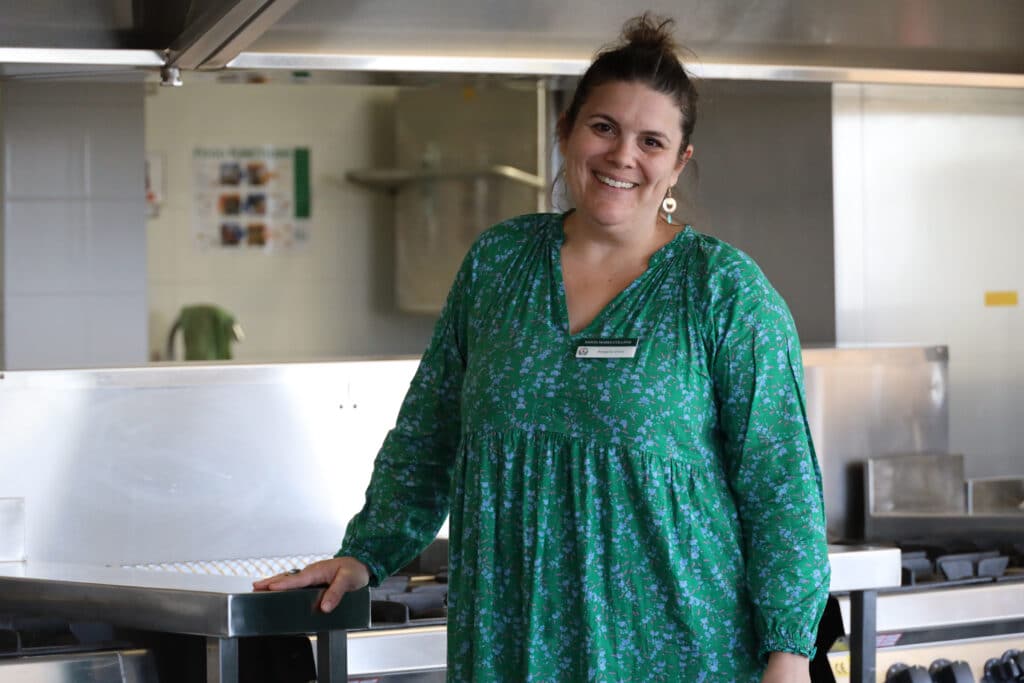
We had the pleasure of sitting down with Angela Vinci, one of our talented Home Economics and Religious Education teachers, to learn about her inspiring journey and teaching philosophy. Angela is also a past student of Santa Maria College from the Class of 1994.
From her personal inspirations to fostering an inclusive learning environment, Angela’s passion for education and dedication to her students shine brightly. Let’s dive into our insightful conversation.
What inspired you to become a Home Economics and Religious Education teacher? How do these subjects complement each other in your teaching philosophy?
What inspired me to become a teacher probably had a lot to do with the wonderful experiences I had at school. I have very fond memories of some of my teachers, and most of them taught me subjects I didn’t love but whom I developed very positive student-teacher relationships with. My favourite subjects were Home Economics, Science and Religion. These are all the subjects I teach now. I haven’t always been a teacher. I am a qualified nutritionist. I love food, have a curious mind for science, particularly the human body, and my faith has always been an integral part of who I am.
My teaching philosophy is very simple; it’s about relationships. I invest a significant amount of time and energy in getting to know my students. Who they are; what is their favourite food, what sports they play, are they a boarder? I take a genuine interest in each of them. I strongly and wholeheartedly believe positive student-teacher relationships are paramount to providing the best learning outcomes for our students and encouraging them to achieve excellence in everything they do. It is all about mutual understanding, respect, and trust.
Both Home Economics and Religion touch on personal and practical aspects of my student’s lives. In Home Economics, I teach valuable life skills related to food, nutrition, and the cost of keeping up with the latest fashions, which are directly relevant to students’ daily needs and concerns. In Religion, I address their spiritual beliefs, values, and ethical considerations, engaging them on a deeper level. By connecting with my students through these personal and practical subjects, I believe I can create strong foundations for building positive relationships.
How do you find the balance between teaching Home Economics and Religious Education?
This is not really something I have thought about. I suppose subconsciously, I do find a balance as both subjects can be quite different to each other, and a textiles class, although practical is still much different to a food class. Probably providing each class with a set of expectations and reinforcing those in each class I teach helps me find a balance.
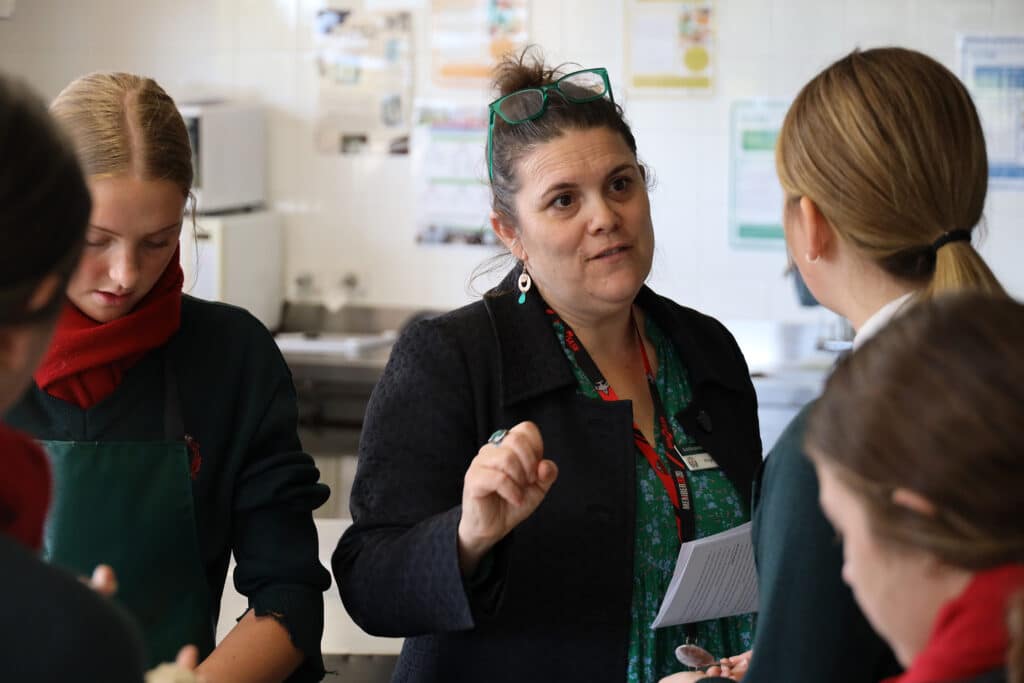
How do you foster a supportive and inclusive learning environment in your classes?
Fostering a supportive and inclusive learning environment in my classes is essential to ensure all my students feel valued, respected, and engaged in their learning journey. As an educator, I use various strategies to create a positive classroom atmosphere where students can thrive academically, emotionally and spiritually.
I set clear expectations for respectful behaviours and open communication. This creates a safe space for students to express their thoughts and ideas without fear of judgment. In Home Economics, this might involve encouraging students to share their unique cultural dishes and food traditions, promoting a sense of diversity and inclusion in the culinary experience. Whereas, in Religion classes, this might facilitate whole class discussions on various religious beliefs and practices, emphasising the importance of respectful dialogue and understanding different viewpoints.
In what ways do you encourage creativity and critical thinking among your students?
Encouraging critical thinking and creativity in Home Economics and Religion classes involves designing engaging projects, encouraging thoughtful discussions, and providing opportunities for students to explore and express their ideas.
In both learning areas, I provide students with opportunities for self-expression and creativity. In Home Economics, students design and produce their own food items relating to a specific design brief which may include catering to diverse dietary needs and preferences. In Religion, students create artwork, poems, and presentations that express their personal experiences and reflections on spiritual topics, fostering a deeper connection to the subject matter.
By incorporating these strategies, I can empower students to become analytical thinkers, creative problem solvers, and open-minded individuals. This fosters the development of skills like analysing information, considering diverse perspectives, and applying learning to real-world situations. Additionally, promoting creative expression and exploring personal interests allows students to deepen their understanding of the subjects. These cultivated skills and mindsets extend beyond academics, equipping students with valuable life skills essential for success and positive contributions to society.
What do you enjoy most about teaching, and what keeps you motivated in your role?
What I most enjoy about teaching is the students. I love the daily interactions; they are not always positive but provide us with an opportunity to learn and grow. I love answering their questions, challenging, praising, and guiding them. I love celebrating their achievements, listening to their stories and laughing with them. Knowing these interactions await me every day keeps me motivated in my role.
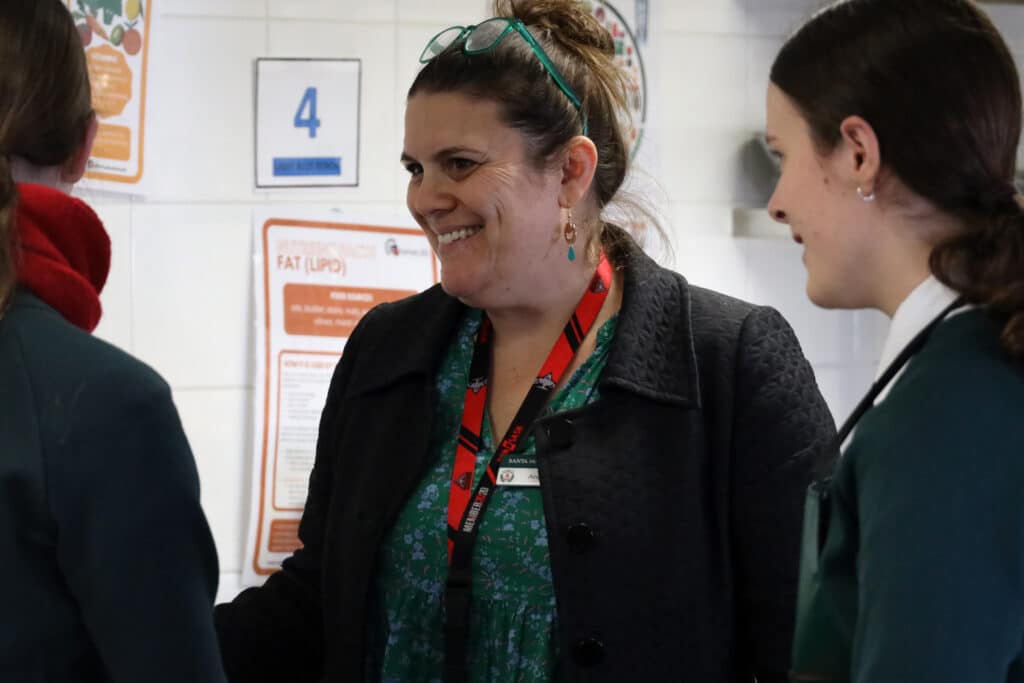
As a Santa Maria alumni, what are some of your most memorable moments or events from school that have influenced you?
I absolutely loved my time at Santa Maria. Some of my most memorable moments would have to be the Ski Trip to Falls Creek in Victoria, school camps (I think we went on one every year, although I was not keen on the Santa Maria, Aquinas Year 12 camp!), excursions, sports carnivals, clowning around in RE and the Year 12 graduation celebrations. None of these moments would have been as memorable and fun had it not been for the relationships I had with my peers and my teachers. It was sharing these moments with each other that made them most memorable. So, I am sure school and all the interactions with my teachers and peers have influenced me in some way to become the person I am now and why I hold such importance on connections and positive relationships. Santa Maria has provided me with many lifelong friendships I cherish and am thankful for.
Looking back, are there any decisions or choices you made that significantly influenced you and set you on your current path?
I’m sure there are decisions or choices and circumstances that have contributed to my current path. Having my children while I was young set me on a path to search for a more family-friendly career, allowing me to impart my passion and knowledge for food, textiles, and science and share my faith.
In what ways did your experience at Santa Maria help you develop essential life skills? How do you apply those skills?
Throughout my experiences at Santa Maria, I developed various essential life skills, including critical thinking, problem-solving, effective communication, teamwork, resilience, time management and cultural awareness. These skills have proven immensely beneficial, empowering me to make well-informed decisions, foster meaningful relationships, navigate challenges with tenacity and effectively manage various responsibilities across different aspects of my life.
Thank you so much for sharing your story with us, Angela! You undoubtedly are an incredibly positive force in your students’ lives.
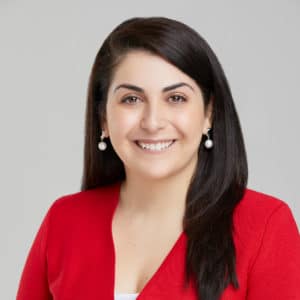
From the President: May 2024
We have some great stories in this month’s blog. Also Look out for information about our OGA Movie Night screening of The Way, My Way.
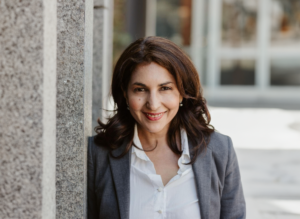
Lisa Sorger: Sisterhood Network Series
Join us for an inspiring evening at the second session of our Sisterhood Networking Series with Dr Lisa Sorger (Ramakrishnan, 1987).
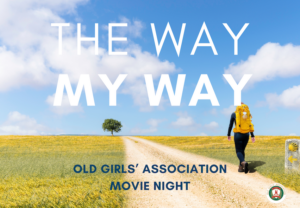
OGA Movie Night: The Way, My Way
Join us for a screening of The Way, My Way, the true story of an Australian man’s transformative experience walking the Camino de Santiago.
- alumni, Featured
Author: Santa Maria College
Santa Maria College is a vibrant girls school with a growing local presence and reputation. Our Mission is to educate young Mercy women who act with courage and compassion to enrich our world. Santa Maria College is located in Attadale in Western Australia, 16 km from the Perth CBD. We offer a Catholic education for girls in Years 5 – 12 and have 1300 students, including 152 boarders.







